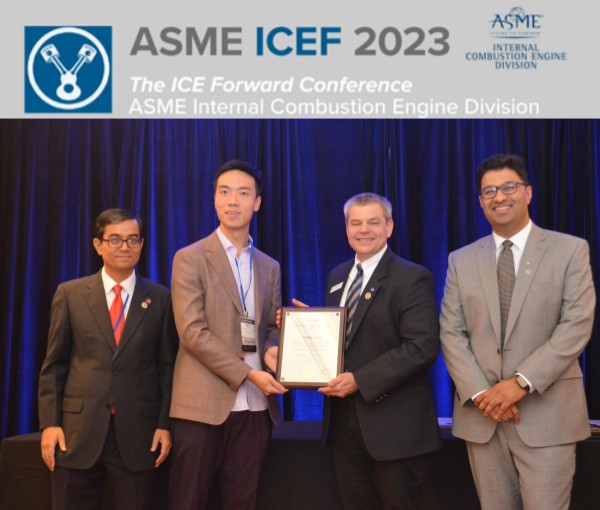The University of Michigan-Shanghai Jiao Tong University Joint Institute (UM-SJTU JI, JI hereafter) undergraduate student Ziming Zhou majoring in Electrical and Computer Engineering has become the winner of the undergraduate student research competition at the 2023 ICE Forward Conference of the American Society of Mechanical Engineers (ASME), an annual event inviting undergraduate researchers that have studied in the field of internal combustion engines, emissions systems, fuels and sprays, or carbon management.
Ziming Zhou, who enrolled at JI in 2021, was invited to deliver a presentation on his research project titled “Planar In-cylinder Flow Field Prediction based on Physics-inspired Automated Machine Learning Framework” to over 200 leading experts in the internal combustion engine field at the ASME conference held in Pittsburgh in October.

Ziming Zhou (second on the left) receives award from conference leaders of ASME ICEF 2023.
Engine efficiency is one of the most important ways to achieve “peak carbon” and “carbon neutrality”. The efficiency of combustion engines has received increasing attention from the energy and automotive industries in terms of energy conservation and emission reduction. In terms of fuel-air mixing strategy, non-uniform mixing between fuel and air usually leads to incomplete combustion and increased pollutant generation. Therefore, it is important to understand the mixing mechanism of fuel and air in the cylinder under different operating conditions in order to achieve “fuel reduction”.

Ziming Zhou gives a presentation at the ASME conference.
Ziming Zhou, under the guidance of Professor David Hung and Postdoctoral Researcher Fengnian Zhao at JI, incorporates the spatiotemporal characteristics of flow fields into a machine learning framework, achieving accurate flow field predictions across high, medium, and low swirl ratios within engine cylinders. This research work employed an implicit physics constraint strategy in the model construction process, deeply integrating physical information with the model structure. This strategic approach confers notable advantages in predicting flow fields, especially under complex operating conditions.

Slide of Ziming Zhou’s presentation displaying research finding
Personal Profile

Ziming Zhou is a JI student enrolled in 2021 as an Electrical and Computer Engineering major. He is participating in a dual-degree program at the University of Michigan, majoring in Computer Science. His research work centers around data-driven analysis and prediction of in-cylinder flow fields, physics-informed neural networks, and the engineering application of numerical analysis methods. He has received honors such as the National Scholarship for Undergraduates and the John Wu & Jane Sun Excellence Scholarship.

Fengnian Zhao is a JI postdoctoral researcher. His research focuses on complex fluid laser diagnostics and 3D reconstruction, spray atomization, gas-liquid coupling mechanisms, and data-driven analysis and prediction. He has received honors including the fund support from China Postdoctoral Science Foundation and the “Morning Star” Postdoctoral Fellowship at Shanghai Jiao Tong University.

David Hung is a JI tenured professor and doctoral supervisor holding the positions of Associate Dean for Academic Affairs and John Wu & Jane Sun Chair Professor. With over 25 years of experience in research and development in the field of automotive engineering, particularly in powertrains and internal combustion engine combustion systems, he is a Fellow of the Society of Automotive Engineers (SAE International).
Source: SJTU JI
Editor on Duty: Yan Cheng

